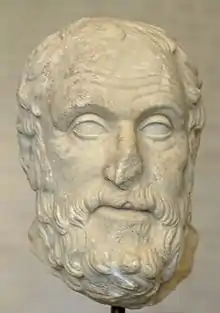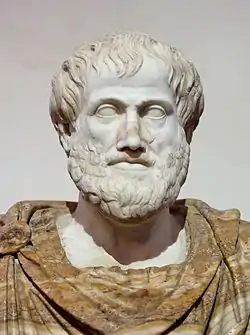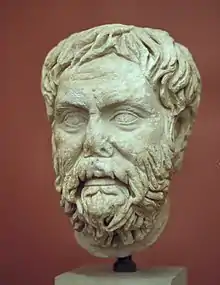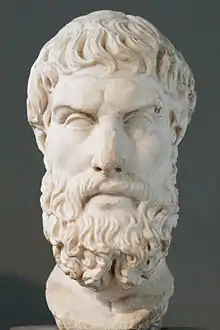Hellenistic philosophy
Hellenistic philosophy is the period of Western philosophy and Ancient Greek philosophy during the Hellenistic period.
Background

The Hellenistic period followed the conquests of Alexander the Great (356-323 BCE), who had spread Ancient Greek culture throughout the Middle East and Western Asia, following the previous cultural period of Classical Greece. The classical period in Ancient Greek philosophy had begun with Socrates (c. 470-399 BCE), whose student Plato had taught Aristotle, who in turn had tutored Alexander. While the classical thinkers were mostly based in Athens, the Hellenistic period saw philosophers active around the empire. The period began with the death Alexander in 323 BCE (following that of Aristotle in 322), and was followed by the predominance of Ancient Roman philosophy during the Roman Imperial period.
Developments and debates in thought
The founders of the Academy, the Peripatetics, Cynicism and Cyrenaicism had all been students of Socrates, while Stoicism was indirectly influenced by him.[1] Socrates' thought was therefore influential for many of these schools of the period, leading them to focus on ethics and how to reach eudaimonia (the good life), and some of them followed his example of using self-discipline and autarky to this end.[2] According to A. C. Grayling, the greater insecurity and loss of autonomy of the era drove some to use philosophy as a means to seek inner security from the external world.[3] This interest in using philosophy to improve life was captured in Epicurus' claim that "empty are the words of that philosopher who offers therapy for no human suffering".[4]
Epistemology
The epistemology of the Epicureans was empiricist, with knowledge being ultimately sourced from the senses.[4] Epicurus argued that sensory information is never false, though it may be misleading sometimes, and that "If you fight against all sensations, you will not have a standard against to which judge even those of them you say are mistaken".[5] He responded to an objection to empiricism made by Plato in Meno, according to which one cannot search for information without having some pre-existing idea of what to search for, hence meaning that knowledge must precede experience.[6] The Epicurean response is that prolepsis (preconceptions) are general concepts which allow particular things to be recognised, and that these emerge from repeated experiences of similar things.[6]
Platonism
Platonism represents the philosophy of Socrates' student, Plato and philosophical systems closely derived from it.
Old Academy
Early Platonism, known as the "Old Academy" begins with Plato, followed by Speusippus (Plato's nephew), who succeeded him as the head of the school (until 339 BC), and Xenocrates (until 313 BC). Both of them sought to fuse Pythagorean speculations on number with Plato's theory of forms.
Academic skepticism

Academic skepticism is the period of ancient Platonism dating from around 266 BC, when Arcesilaus became head of the Platonic Academy, until around 90 BC, when Antiochus of Ascalon rejected skepticism, although individual philosophers, such as Favorinus and his teacher Plutarch continued to defend Academic skepticism after this date. The Academic skeptics maintained that knowledge of things is impossible. Ideas or notions are never true; nevertheless, there are degrees of truth-likeness, and hence degrees of belief, which allow one to act. The school was characterized by its attacks on the Stoics and on the Stoic dogma that convincing impressions led to true knowledge.
- Arcesilaus (316–232 BC)
- Carneades (214–129 BC)
- Cicero (106–43 BC)
Middle Platonism
Around 90 BC, Antiochus of Ascalon rejected skepticism, making way for the period known as Middle Platonism, in which Platonism was fused with certain Peripatetic and many Stoic dogmas. In Middle Platonism, the Platonic Forms were not transcendent but immanent to rational minds, and the physical world was a living, ensouled being, the World-Soul. The eclectic nature of Platonism during this time is shown by its incorporation into Pythagoreanism (Numenius of Apamea) and into Jewish philosophy[7] (Philo of Alexandria).
- Plutarch (46–after 119 AD)
Neoplatonism
Neoplatonism, or Plotinism, is a school of religious and mystical philosophy founded by Plotinus in the 3rd century AD and based on the teachings of Plato and the other Platonists. The summit of existence was the One or the Good, the source of all things. In virtue and meditation the soul had the power to elevate itself to attain union with the One, the true function of human beings. Non-Christian Neoplatonists used to attack Christianity until Christians such as Augustine, Boethius, and Eriugena adopt Neoplatonism.
- Plotinus (205–270 AD)
- Porphyry (233–309 AD)
- Iamblichus of Chalcis (245–325 AD)
- Proclus (412–485 AD)
Cyrenaicism
Cyrenaicism was founded in the fourth century BC by Aristippus (ca. 435-356), who was a student of Socrates. Aristippus the Younger, the grandson of the founder, argued that the reason pleasure was good was that it was evident in human behavior from the youngest age, because this made it natural and therefore good (the so-called cradle argument).[8] The Cyrenaics also believed that present pleasure freed one from anxiety of the future and regrets of the past, leaving one at peace of mind.[9] These ideas were taken further by Anniceris (fl. 300 BCE), who expanded pleasure to include things like friendship and honour.[10] Theodorus (ca. 340-250) disagreed with this, and instead argued that social ties should be cut and self-sufficiency be espoused instead.[11] Hegesias of Cyrene (fl. 290) on the other hand claimed that life could ultimately not be overall pleasurable.[11]
Cynicism
The Cynics thought was based on living with bare necessities and in accordance with nature.[12] The first Cynic was Antisthenes (ca. 446–366 BCE), who was a student of Socrates.[13] He introduced the ideas of ascetism and opposition to social norms.[14] His follower was Diogenes (ca. 412–323 BCE), who followed in this direction.[15] Instead of pleasure, the Cynics promoted purposefully living in hardship (ponos.)[15] All of this was because it was seen as natural and therefore as good, whereas society was innately unnatural and therefore bad, as were material benefits.[15] Pleasures provided by nature (which would be immediately accessible) were acceptable, however.[16] The Cynic Crates of Thebes (365–285 BC) hence claimed that "Philosophy is a quart of beans and to care for nothing".[16] Other Cynics included Menippus (c. 275 BCE) and Demetrius (10–80 CE).
Peripatetic school

Peripatetic school composed the philosophers who maintained and developed the philosophy of Aristotle. They advocated examination of the world to understand the ultimate foundation of things. The goal of life was the eudaimonia which originated from virtuous actions, which consisted in keeping the mean between the two extremes of the too much and the too little.
- Theophrastus (371–287 BC)
- Strato of Lampsacus (335–269 BC)
- Alexander of Aphrodisias (c. 200 AD)
- Aristocles of Messene (c. 1st century AD)
Pyrrhonism

Pyrrhonism is a school of philosophical skepticism that originated with Pyrrho in the 3rd century BC, and was further advanced by Aenesidemus in the 1st century BC. Its objective is ataraxia (being mentally unperturbed), which is achieved through epoché (i.e. suspension of judgment) about non-evident matters (i.e., matters of belief).
- Pyrrho (365–275 BC)
- Timon of Phlius (320–230 BC)
- Aenesidemus (1st century BC)
- Sextus Empiricus (2nd century AD)
Epicureanism

Epicureanism was founded by Epicurus in the 3rd century BC. Its epistemology was based on empiricism, believing that sensual experiences cannot be false, even if they can be misleading, as they are product of the world interacting with one's body.[17] Repeated sensory experiences can then be used to form concepts (prolepsis) about the world, and such concepts which are widely shared ('common conceptions') can further provide the basis for philosophy.[17] Applying his empricism, Epicurus supported atomism by noting that matter could not be destroyed as it would eventually dwindle down to nothing, and that there must be void for matter to move around.[18] While this in itself did not prove the existence of atoms, he argued against the alternative by noting that infinitely divisible objects would be infinitely large, similar to Zeno's paradoxes.[19]
It viewed the universe as being ruled by chance, with no interference from gods. It regarded absence of pain as the greatest pleasure, and advocated a simple life.
- Epicurus (341–270 BC)
- Metrodorus (331–278 BC)
- Hermarchus (325-250 BC)
- Zeno of Sidon (1st century BC)
- Philodemus (110–40 BC)
- Lucretius (99–55 BC)
Stoicism
_-_BEIC_6353768.jpg.webp)
Stoicism was founded by Zeno of Citium in the 3rd century BC. Based on the ethical ideas of the Cynics, it taught that the goal of life was to live in accordance with Nature. It advocated the development of self-control and fortitude as a means of overcoming destructive emotions.
- Zeno of Citium (333–263 BC)
- Cleanthes (331–232 BC)
- Chrysippus (280–207 BC)
- Panaetius (185–110 BC)
- Posidonius (135–51 BC)
- Seneca (4 BC – 65 AD)
- Epictetus (55–135 AD)
- Marcus Aurelius (121–180 AD)
Hellenistic Judaism
Hellenistic Judaism was an attempt to establish the Jewish religious tradition within the culture and language of Hellenism. Its principal representative was Philo of Alexandria.
- Philo of Alexandria (30 BC – 45 AD)
- Josephus (37–100 AD)
Neopythagoreanism
Neopythagoreanism was a school of philosophy reviving Pythagorean doctrines, which was prominent in the 1st and 2nd centuries AD. It was an attempt to introduce a religious element into Greek philosophy, worshipping God by living an ascetic life, ignoring bodily pleasures and all sensuous impulses, to purify the soul.
- Nigidius Figulus (98–45 BC)
- Apollonius of Tyana (15/40–100/120 AD)
- Numenius of Apamea (2nd century AD)
Hellenistic Christianity
Hellenistic Christianity was the attempt to reconcile Christianity with Greek philosophy, beginning in the late 2nd century. Drawing particularly on Platonism and the newly emerging Neoplatonism, figures such as Clement of Alexandria sought to provide Christianity with a philosophical framework.
- Clement of Alexandria (150–215 AD)
- Origen (185–254 AD)
- Augustine of Hippo (354–430 AD)
- Aelia Eudocia (401–460 AD)
See also
References
- Grayling, A. C. (2019-06-20). The History of Philosophy. Penguin UK. p. 99. ISBN 978-0-241-98086-6.
Although the founder of Stoicism, Zeno of Citium, lived nearly a century later – he was a child of eight when Aristotle died in 322 BCE – his school shared these Socratic roots; he was influenced by the Cynics who had taken their cue from the hardier and more convention-opposing aspects of Socrates’ outlook and style of life.
- Adamson, Peter (2015). Philosophy in the Hellenistic and Roman Worlds. Oxford University Press. pp. 8–9. ISBN 978-0-19-872802-3.
- Grayling, A. C. (2019-06-20). The History of Philosophy. Penguin UK. p. 99. ISBN 978-0-241-98086-6.
- Sellars, John (2018). Hellenistic Philosophy. Oxford University Press. p. 32. ISBN 978-0-19-967412-1.
- Adamson, Peter (2015). Philosophy in the Hellenistic and Roman Worlds. Oxford University Press. p. 26. ISBN 978-0-19-872802-3.
- Sellars, John (2018). Hellenistic Philosophy. Oxford University Press. p. 36. ISBN 978-0-19-967412-1.
- https://www.britannica.com/topic/Platonism/Medieval-Platonism#ref32576
- Adamson, Peter (2015). Philosophy in the Hellenistic and Roman Worlds. Oxford University Press. p. 20. ISBN 978-0-19-872802-3.
- Adamson, Peter (2015). Philosophy in the Hellenistic and Roman Worlds. Oxford University Press. p. 21. ISBN 978-0-19-872802-3.
- Adamson, Peter (2015). Philosophy in the Hellenistic and Roman Worlds. Oxford University Press. p. 22. ISBN 978-0-19-872802-3.
- Adamson, Peter (2015). Philosophy in the Hellenistic and Roman Worlds. Oxford University Press. p. 23. ISBN 978-0-19-872802-3.
- Adamson, Peter (2015). Philosophy in the Hellenistic and Roman Worlds. Oxford University Press. p. 10. ISBN 978-0-19-872802-3.
- Adamson, Peter (2015). Philosophy in the Hellenistic and Roman Worlds. Oxford University Press. p. 10. ISBN 978-0-19-872802-3.
- Adamson, Peter (2015). Philosophy in the Hellenistic and Roman Worlds. Oxford University Press. p. 11. ISBN 978-0-19-872802-3.
- Adamson, Peter (2015). Philosophy in the Hellenistic and Roman Worlds. Oxford University Press. p. 14. ISBN 978-0-19-872802-3.
- Adamson, Peter (2015). Philosophy in the Hellenistic and Roman Worlds. Oxford University Press. p. 15. ISBN 978-0-19-872802-3.
- Adamson, Peter (2015). Philosophy in the Hellenistic and Roman Worlds. Oxford University Press. p. 26. ISBN 978-0-19-872802-3.
- Adamson, Peter (2015). Philosophy in the Hellenistic and Roman Worlds. Oxford University Press. p. 27. ISBN 978-0-19-872802-3.
- Adamson, Peter (2015). Philosophy in the Hellenistic and Roman Worlds. Oxford University Press. p. 28. ISBN 978-0-19-872802-3.
Sources
- A. A. Long, D. N. Sedley (eds.), The Hellenistic Philosophers (2 vols, Cambridge University Press, 1987)
- Giovanni Reale, The Systems of the Hellenistic Age: History of Ancient Philosophy (Suny Series in Philosophy), edited and translated from Italian by John R. Catan, Albany, State of New York University Press, 1985, ISBN 0887060080.
- "Platonism." Cross, F. L., ed. in The Oxford Dictionary of the Christian Church. New York: Oxford University Press. 2005
External links
| Wikimedia Commons has media related to Hellenistic philosophy. |
- The London Philosophy Study Guide offers many suggestions on what to read, depending on the student's familiarity with the subject: Post-Aristotelian philosophy
- "Readings in Hellenistic Philosophy" on PhilPapers, edited by Dirk Baltzly